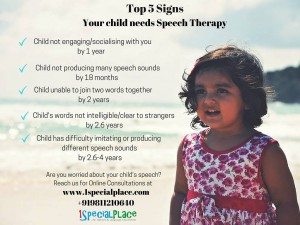
5 Signs That Your Child Needs Speech Therapy
5 Signs That Your Child Needs Speech Therapy
Communication is a fundamental skill that forms the basis of our interactions and connections with others. For children, developing effective communication skills is essential for academic success, social interactions, and overall well-being. However, some children may experience challenges in this area that could benefit from professional intervention. Speech therapy is a specialized field that can help children overcome these challenges and reach their full communication potential. Below, we’ll explore some common signs that might indicate a child could benefit from speech therapy.
A child who shows these signs might require professional intervention by a Speech Language Therapist. Click here for the best speech therapist in India.
By observing these signs it is possible for you as a parent to determine whether he needs speech therapy :
-
- By the age of one year, your child has not engaged/socialized with you.
- Your child does not produce speech sounds by the age of 18 months
- The child is unable to join two words together by the age of 2 years
- The child’s words are not clear to strangers by the age of 2.6 years
- Language is caught, not taught. It’s essential that you provide a stimulating environment for your child. Ensure a childhood filled with love, opportunities and encouragement.
More common signs
Communication is a fundamental skill that forms the basis of our interactions and connections with others. For children, developing effective communication skills is essential for academic success, social interactions, and overall well-being. However, some children may experience challenges in this area that could benefit from professional intervention. Speech therapy is a specialized field that can help children overcome these challenges and reach their full communication potential. Below, we’ll explore some common signs that might indicate a child could benefit from speech therapy.
1. Articulation Issues: Articulation refers to the clear pronunciation of sounds and words. If a child consistently has difficulty pronouncing certain sounds, substitutes one sound for another, or speaks in a way that is difficult to understand, it could be a sign of an articulation disorder. This can impact their ability to communicate effectively and may lead to frustration for both the child and those trying to understand them.
2. Delayed Speech: While there’s a range of normal development if a child’s speech is significantly delayed compared to their peers, it might be cause for concern. For example, if a child is not speaking their first words by around 12 months or using simple phrases by around 2 years, speech therapy might be beneficial.
3. Difficulty with Fluency: Fluency issues include stammering or stuttering, where a child’s speech is disrupted by frequent repetitions, hesitations, or prolonged sounds. While many children may go through a temporary phase of disfluency as they develop language skills, persistent and severe fluency issues might warrant professional intervention.
4. Limited Vocabulary: A child’s vocabulary grows rapidly during early childhood. If a child consistently uses a limited range of words or struggles to find the right words to express themselves, it could indicate a language delay or disorder. A speech therapist can help expand their vocabulary and improve their ability to convey thoughts and ideas.
5. Difficulty Following Directions: Language is not just about speaking; it’s also about understanding. If a child has trouble comprehending and following simple instructions, it might be a sign of a language processing issue. This can impact their performance in school, their ability to engage in conversations, and their overall confidence.
6. Challenges in Social Interaction: Communication is at the heart of social interactions. If a child struggles to initiate conversations, maintain eye contact, take turns while speaking, or understand social cues, it could indicate underlying communication difficulties. Speech therapy can help improve these skills and enhance their ability to form meaningful relationships.
7. Difficulty with Storytelling: Telling a coherent and organized story involves a complex interplay of language skills. If a child has trouble sequencing events, using appropriate grammar, or structuring narratives, speech therapy can provide strategies to help them develop these skills.
8. Persistent Baby Talk: While using baby talk is a common developmental phase in early childhood, if a child continues to use overly simplified speech patterns well beyond their peers, it might be a sign of an underlying issue. Speech therapy can help them transition to more age-appropriate language.
9. Lack of Progress over Time: Parents and caregivers are usually the first to notice any speech or language concerns. If a child’s difficulties persist over time without improvement, despite supportive interventions at home, seeking professional guidance from a speech therapist is advisable.
10. Frustration and Emotional Changes: Struggling to communicate can lead to frustration, anxiety, and even behavioural changes in a child. If a child becomes noticeably distressed when trying to communicate or avoids situations that involve speaking, speech therapy can address these emotional challenges and provide effective coping strategies.
Early intervention is key when it comes to speech and language challenges in children. If you notice any of these signs in your child, consider reaching out to a qualified speech therapist for an evaluation. Every child is unique, and a tailored approach to speech therapy can make a significant difference in helping them develop the communication skills they need to thrive in various aspects of life.
Based on these indicators we have developed a screening test to check for speech and language delays. As a matter of fact, it is a simple quiz consisting of questions that will provide you with an indication of whether your child’s speech and language development is progressing as per his/her age. Over 5000 parents have already used the test to see if their child is meeting his speech milestones. Click here to take the free screening test.
If you are concerned about your child’s speech & language development you can also book an online speech therapy session with our experts. Book your sessions now
- Addressing the Silent Struggle in Special Needs Children - December 22, 2023
- Swallowing Difficulties: A Comprehensive Guide - December 12, 2023
- 6 Simple Steps to Enhance Speech Clarity and Connect with Confidence - November 3, 2023


Leave a Comment
(0 Comments)